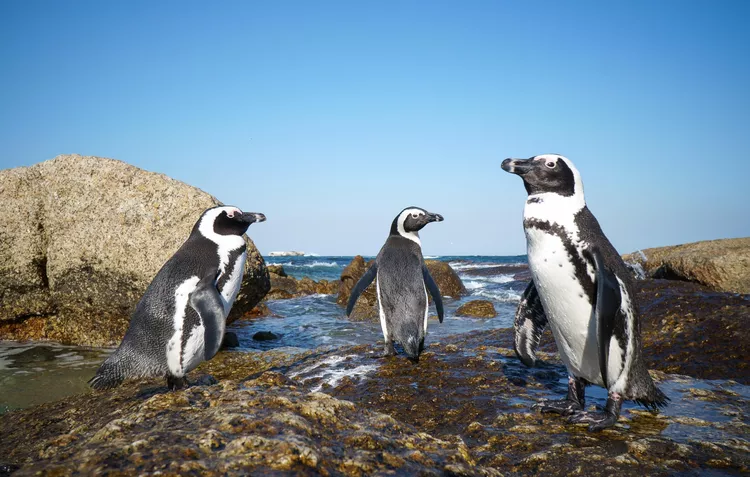Summary
Boulders Beach: A Unique Encounter with African Penguins
Boulders Beach lies on the outskirts of Simon’s Town, a southern suburb of Cape Town. Part of Table Mountain National Park, this breathtakingly beautiful nature area boasts fine white sand and sapphire waters. It’s also home to one of the world’s only land-based African penguin colonies. These endangered birds are native to South Africa and Namibia. Notably, they are loved by locals and tourists alike for their charismatic nature, diminutive size, and smart black-and-white plumage, offering visitors the privilege of swimming alongside them in their natural environment.
What to Expect
Boulders Beach comprises three beaches, three boardwalks, and a penguin viewing area. To gain access, a conservation fee is required at the visitor center. The main beach presents an idyllic cove with panoramic views across False Bay, shielded by ancient granite boulders from wind, waves, and currents. This makes it a sheltered spot ideal for picnicking and a safe place for swimming. While the sea is warmer in False Bay compared to the Atlantic Ocean beaches, it’s prudent to prepare for cooler temperatures, which can reach highs of 70°F (21°C) in January and dip to 57°F (14°C) in August.
The penguins roam freely, displaying a natural curiosity, which means you’re likely to observe their antics around picnic areas or even swimming beside you in the shallows. For an up-close experience, stroll along the boardwalk that connects the main beach to Foxy Beach, passing through the colony and coming within just feet of their nesting sites. The boardwalk culminates at a viewing platform, providing an elevated view of the penguins socializing, fishing, and engaging in playful activities in the waves. In winter, a keen eye may even catch sight of migrating humpback and southern right whales in the bay.
The Boulders Beach Colony
The Boulders Beach colony was established in 1983 with just a single breeding pair. Their initial success attracted other African penguins from offshore colonies, resulting in an expansion of the nesting site. However, in 2000, penguins in the Cape Town area faced a crisis when an iron ore tanker called the MV Treasure sank near Robben Island, releasing 1,300 tons of oil into the ocean. More than 19,000 oiled penguins were rescued, and an additional 19,500 were captured and relocated to the Eastern Cape. Remarkably, over 91% of the oiled birds were rehabilitated and released back into the wild, marking this as the largest animal rescue event in history.
In its prime around 2005, the Boulders Beach colony boasted a population of approximately 3,900 birds during the breeding season. Unfortunately, this number has declined to roughly 2,100 birds as of 2011. This decrease is likely attributed to the global decline of the African penguin population due to factors such as habitat destruction, overfishing, climate change, and marine pollution. Consequently, African penguins are presently classified as Endangered on the IUCN Red List.
Tips for a Positive Experience
While the penguins may come within touching distance, it is essential to remember that making contact with them is not allowed. This policy exists for the safety of both penguins and visitors, as these birds have sharp beaks and will defend themselves if they feel threatened. Notably, Boulders Beach is part of a Marine Protected Area, functioning as a no-take zone; therefore, fishing and the removal of any marine life, including shells, are prohibited. Additionally, alcohol and smoking are not allowed on-site.
If you plan to visit Boulders Beach during the South African winter (June to August), wearing a wetsuit may prolong your enjoyment in the water. Conversely, during summer months, carrying sunscreen and sufficient drinking water is advisable. It is crucial to note that beach space becomes limited at high tide. Therefore, if your intention is to picnic or sunbathe, remember to check the tide tables in advance. Lastly, the beach can get particularly busy during the festive period; thus, it is wise to arrive early in the morning or later in the afternoon to avoid crowds and secure parking.
Practical Information
Good news: penguins are present at Boulders Beach year-round, with their numbers peaking during the breeding season from February to August, particularly from March to May when both parents incubate their eggs in shallow burrows. November through January is molting season, so it’s not uncommon for the penguins to appear somewhat bedraggled. The opening times are as follows:
- April to September: 8:00am – 5:00pm
- October to November: 8:00am – 6:30pm
- December to January: 7:00am – 7:30pm
- February to March: 8:00am – 6:30pm
For foreign visitors, the daily rates are R152 per adult and R76 per child, with discounts available for South African citizens and SADC nationals.
Getting to Boulders Beach
The Boulders Beach visitor center is conveniently located on Klentuin Road, just south of Simon’s Town. For those with a car or planning to rent one, it’s an hour’s drive from Cape Town’s V&A Waterfront, assuming traffic conditions permit. Expect scenic views along the way, particularly if driving via Chapman’s Peak, the stunning coastal toll road that meanders along cliffs between Hout Bay and Noordhoek. If driving is not an option, consider taking a taxi or an Uber from Cape Town or Simon’s Town train station. Numerous Cape Town day tours include stops at Boulders Beach.





